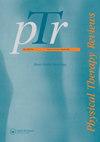Development of a framework for person-centred physiotherapy
IF 0.8
Q4 REHABILITATION
引用次数: 3
Abstract
Abstract Background There is a growing call for healthcare to focus on person-centred practice. This can lead to improved outcomes for patients in terms of physical and psychological health. Challenges exist around how person-centredness is understood in physiotherapy. Having a physiotherapy framework would help support a shared understanding of the meaning of person-centred physiotherapy. Aim The aim of this study was to locate and synthesise studies which have a conceptualisation of person-centred physiotherapy practice. These were used to develop an overarching conceptual framework for person-centred physiotherapy practice. Methods The framework was developed through a systematic process involving a systematic literature search, screening studies against eligibility criteria, data extraction, data synthesis, naming and defining core constructs of person-centred physiotherapy practice, and generation of a pictorial representation of an overarching conceptual framework. Results The person-centred physiotherapy framework is comprised of four constructs: physiotherapist characteristics, which focuses on the knowledge and skills for clinical proficiency, attributes of the physiotherapist, reflection and self-awareness; person-physiotherapist interaction(s), which focuses on partnership, empowerment and self-management; the environment, which focuses on coordinated healthcare delivery, culture of the organisation and practice environment, and the physical environment; and the ongoing unique journey of the person and self-management. The relationships between the constructs reflect the complex nature of person-centred practice. Conclusions The framework presented can be used to better understand person-centred physiotherapy with a view to enhancing practice. The framework needs to be tested further through empirical research to establish its utility.发展以人为本的物理治疗框架
摘要背景越来越多的人呼吁医疗保健注重以人为本的实践。这可以改善患者的身心健康状况。物理治疗中如何理解以人为中心存在挑战。有一个物理治疗框架将有助于支持对以人为中心的物理治疗的含义的共同理解。目的本研究的目的是定位和综合具有以人为中心的物理治疗实践概念的研究。这些被用来为以人为中心的物理治疗实践制定一个总体概念框架。方法该框架是通过系统的过程开发的,包括系统的文献检索、根据资格标准筛选研究、数据提取、数据合成、命名和定义以人为中心的物理治疗实践的核心结构,以及生成总体概念框架的图示。结果以人为中心的物理治疗框架由四个结构组成:物理治疗师特征,侧重于临床熟练程度的知识和技能、物理治疗师的属性、反思和自我意识;与物理治疗师的互动,侧重于伙伴关系、赋权和自我管理;环境,侧重于协调的医疗保健提供、组织文化和实践环境以及物理环境;以及个人正在进行的独特旅程和自我管理。结构之间的关系反映了以人为中心的实践的复杂性。结论所提出的框架可用于更好地理解以人为中心的物理治疗,以期加强实践。该框架需要通过实证研究进一步检验,以确定其效用。
本文章由计算机程序翻译,如有差异,请以英文原文为准。
求助全文
约1分钟内获得全文
求助全文
来源期刊

Physical Therapy Reviews
REHABILITATION-
CiteScore
1.30
自引率
0.00%
发文量
26
期刊介绍:
Physical Therapy Reviews is an international journal which aims to publish contemporary reviews, discussion papers and editorials within physical therapy, and in those basic and clinical sciences which are the basis of physical therapy. The journal is aimed at all those involved in research, teaching and practice within the area of physical therapy. Reviews (both descriptive and systematic) are invited in the following areas, which reflect the breadth and diversity of practice within physical therapy: •neurological rehabilitation •movement and exercise •orthopaedics and rheumatology •manual therapy and massage •sports medicine •measurement •chest physiotherapy •electrotherapeutics •obstetrics and gynaecology •complementary therapies •professional issues •musculoskeletal rehabilitation
 求助内容:
求助内容: 应助结果提醒方式:
应助结果提醒方式:


